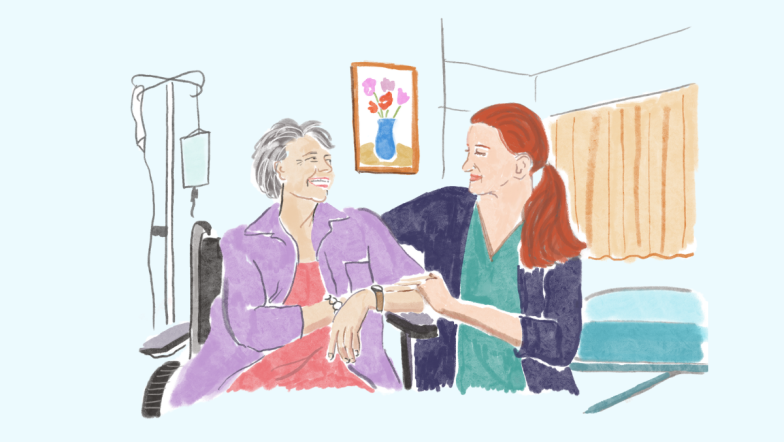What we learned from 12+ months of responding to legal need during the COVID-19 pandemic
25 Jun 2021
Over 12+ months, we directed our legal services towards individuals impacted by the global COVID-19 (coronavirus) pandemic. At the end of each month, we have reflected on our service delivery data, as well as analysed any forthcoming trends, in order to adapt and pivot for the month ahead. We have shared these insights with the broader legal services sector in the hopes of strengthening our collective response and improving the experience of finding and receiving legal help for the people who needed it most.
This report will first zoom out to share our summary of learnings and insights from the broader 12+ months from 1 April 2020 to 30 April 2021, before covering off our findings from the last month of our COVID-19 response, 1 – 30 April 2021.
7 key insights from 12+ months of COVID-response
We receive enquiries online, by phone, via email and in person. During the project period, we received 18,368 online enquiries via our intake tool (this includes partial completions, completed applications, applications sorted into program streams and applications made directly to each program stream). The tool is designed to provide quick and early feedback on eligibility and directs people to other services and resources where relevant. A high off-ramping rate means the tool is doing its job well and making the intake process more efficient for people applying for help. Where an online applicant is likely to be eligible, their intake and triage is finalised via a conversation with a Justice Connect team member.
From April 2020 to March 2021, 5,877 people spoke directly with one of our services, some of which were either referred to us or had applied using the intake tool.
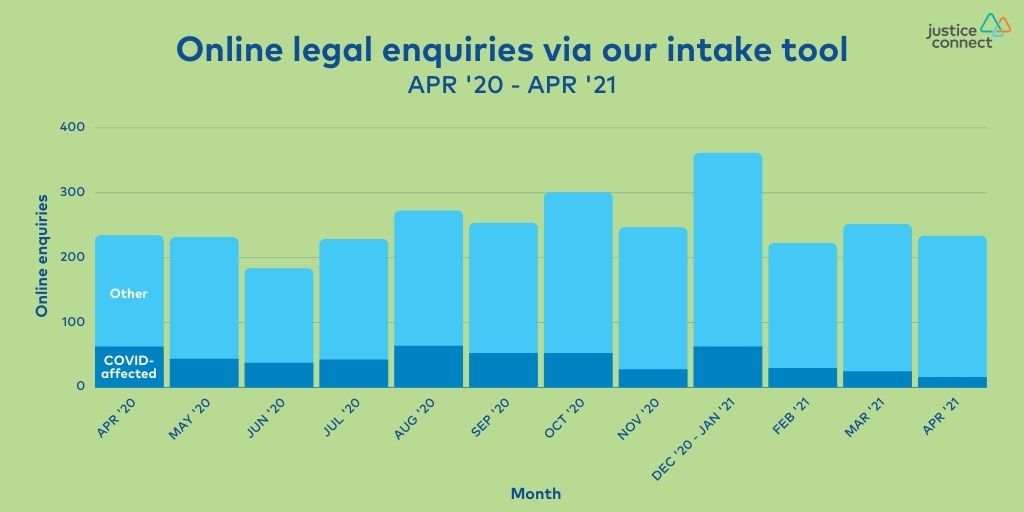
Our online self-help tool Dear Landlord had 4,686 active users, and a total of 669 documents were generated (including requests for rent reductions or VCAT hearing reschedules).
Below we have summarised the top 7 trends and learnings our team of experts uncovered during the past 12+ months of rapid response to the COVID-19 pandemic.
1. Fast moving policy changes = a gap in information about emergency powers
Early on in the pandemic, we identified there was significant confusion across Australia when it came to the varied emergency powers the Federal and State Governments were enacting. We developed plain language explainers of these powers and the subsequent public health directions to fill this gap and enable the community to understand these extraordinary usages of public power in a clear and accessible way.
These resources gained authority as a trusted source of timely information, and continued to surface in organic search results over the 12+ months. We particularly saw spikes to each jurisdiction’s resource depending on whether there were lockdown announcements or spikes of coronavirus cases at any given time (for example, see QLD spike in March ‘21 or WA spike in April ‘21 in below graph).
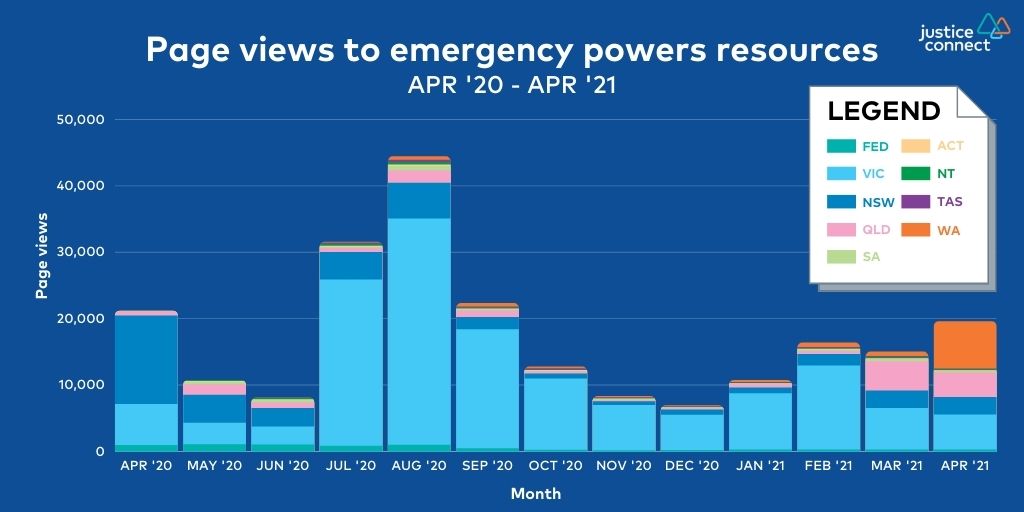
2. Empowering people to understand and take action to avoid eviction is crucial
Over the last 12+ months, nearly 24,000 people have accessed Dear Landlord.
Before the outbreak of COVID-19, people were already finding it hard to afford safe, secure and permanent housing. We used our frontline service delivery and Dear Landlord data to advocate with the Victorian Government to establish the strongest COVID tenancy protections in Australia.
Given the financial impacts of COVID-19 on renters and in response to feedback we heard from renters, we re-designed our online self-help tool Dear Landlord to adapt to the temporary Victorian COVID-19 tenancy laws.
The tool gave options for renters in Victoria to write a letter to their landlord to help negotiate a rent reduction, or to request a review hearing at VCAT. Empowering people to understand their rights and take action is crucial as a growing cohort faced eviction into homelessness, many of whom had never experienced housing stress before.
In March 2021, Victoria introduced permanent new tenancy laws, including a new eviction process. Again, we redeveloped Dear Landlord to help renters understand their rights and take action to avoid eviction, and relaunched the tool through a targeted digital consumer outreach campaign that spotlighted our new animated video explaining the changes.
Both of these redevelopments followed our strategic service design and delivery principles, and were based on direct insights from people with lived experience of housing insecurity, homelessness and financial instability.
3. People spent 12,987 hours viewing our online self-help resources, which we adapted to emerging issues
During a crisis, existing legal need doesn’t go away, and new problems emerge. COVID-19 also escalated people’s existing legal problems.
Our self-help resources hub is a crucial part of our service delivery and gives us the opportunity to scale our reach and impact, empowering people to understand their legal problems with plain language explainers and pathways to our legal services.
We recorded close to 400,000 page views on our various self-help resources during the last 12+ months. We also spent time analysing emerging search trends and listening to what our clients were telling us to identify emerging legal problems and develop targeted new resources. For example, when court hearings went remote, we developed tailored resources to help people understand the changes, prepare for their own hearings, and know what to expect.
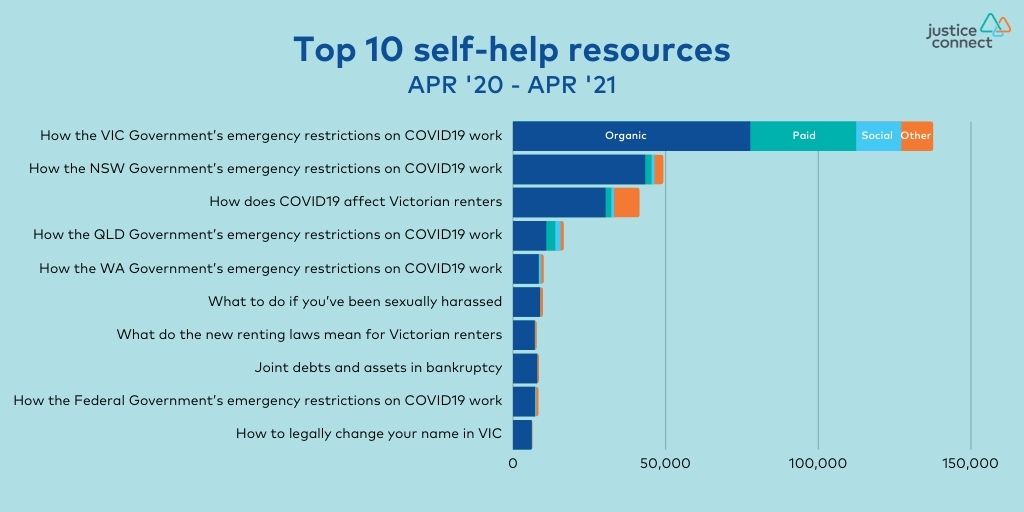
4. Legal help for employment and financial issues was sought-after, as changes to JobKeeper and JobSeeker bred confusion and stress
On Justice Connect Answers – our online legal clinic – questions about employment, banking and finance accounted for nearly a third of the questions we received over the 12+ month period. Similarly, our financial resources were some of the most widely visited pages, especially after major changes or announcements about the Federal Government’s JobKeeper or JobSeeker supports.
We published thorough guides on responding to debt collection during COVID-19, navigating the journey of defaulting on your mortgage, and claiming unpaid wages from businesses who have closed. All of these guides were aimed at preventing or addressing issues before they became a larger legal problem.
5. Social media advertising was a must to reach people as our lives turned online
Social media formed the backbone of our digital consumer outreach strategy during our COVID-19 response. In a time when people were the most physically isolated, we all turned online to connect with our friends, family, co-workers and communities and our outreach strategy shifted to respond to this new reality.
By investing our limited advertising budgets on social media and paid search advertising, we were able to double our social media traffic and increase the volume of people finding us through paid search by over 6000%. This traffic was primarily from 25 – 34 year olds, as well as 65+ year olds.
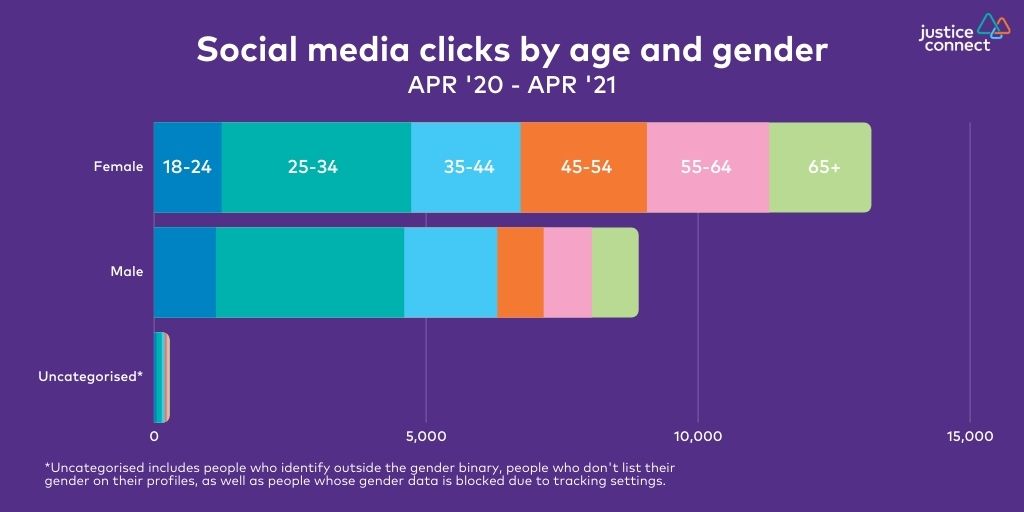
The overall percentage of people accessing our website on mobile shifted from 37% to 49%, bringing a further impetus for us to optimise our resources and tools for mobile users.
6. Industry-specific social media audiences responded well to our outreach
A core part of our digital consumer outreach strategy was reaching the people who needed support the most. One tactic we used to deliver our message to the right audiences was using industry-based audience targeting to serve our ads to communities who had been heavily impacted by lockdowns and changes to their employment and financial situations. For example, we targeted hospitality workers, people from the arts & live events community, regional communities and international students.
Similarly, we aimed to raise awareness about our services and tools via referral pathways by targeting specific ads to frontline care workers such as social workers or caseworkers.
7. Collaboration (both internal and external) is crucial
Internally, our COVID-19 response saw Justice Connect teams collaborating at extremely high rates, which allowed us to access and amplify expertise across the organisation. The result was improved processes, patterns, systems and momentum which we hope to continue leveraging to respond to unmet legal need.
Within the wider sector, we found establishing referral pathways an important part of our service delivery. For example, 8% of our website referrals came from VCAT, 4% via Consumer Affairs Victoria, and 2% from the Victorian Government’s COVID-19 website.
Collaboration was also key with both the legal sector and community sector in responding to increased COVID-19 need, using our evidence and insights to advocate with government for better legal and policy responses to COVID.
We also proudly shared with the sector the data and learnings we distilled at the end of each month of our COVID-19 response via our Fair Matters blog, which were viewed by the sector more than 7,000 times. You can read each month’s report-back by using the links below:
MAY | JUN | JUL | AUG | SEP | OCT | NOV | DEC/JAN | FEB | MAR
Trends on legal need throughout April 2021
Preventing evictions with Dear Landlord
April was the first month where renters in Victoria could once again be legally evicted due to the end of the eviction moratorium and the introduction of new tenancy laws from the 29 March. We saw a 54% increase in enquiries to our Homeless Law program, and 79% of tenancy enquiries related to evictions.
We also saw a 64% increase in people using Dear Landlord in April, reflecting increasing numbers of people facing eviction due to rental arrears.
The majority of people accessing our website, including our online self-help tool for renters Dear Landlord, were women. We also saw an increase in activity from users in regional Victoria, likely due to our increased outreach to regional, remote and rural communities.
More people came to us via referrals from Consumer Affairs Victoria in April (268 people compared to just 102 in March).
We are continuing our targeted digital consumer outreach to unpack what the new laws mean, especially the new eviction process, and offer pathways for taking action to avoid eviction and homelessness.
Unpacking State Governments’ usage of emergency powers
As we’ve seen many times over the last few months, our resources on government use of emergency powers have been a well-visited resource whenever there is a change in COVID-19 rules and restrictions. We saw this happen again in April when the Perth and Peel regions went through a snap lockdown at the end of April. This resulted in a large increase in users from WA visiting our website, mostly visiting our self-help resource about the WA State Government’s emergency powers.
Providing information and pathways for people experiencing financial stress
Since the end of the JobKeeper supplement and the removal of debt protection measures, we have been concerned about the lasting financial impacts the COVID-19 pandemic will have on the community. As such we’ve been highlighting our self-help resources related to bankruptcy, debt, and mortgage defaults. Whilst we have not yet seen a large increase in enquiries for legal help, we predict there may be a sharp increase over the coming months as people adjust to cuts to the safety net well below the poverty line.
Preparing to help keep workers safe
We’ve heard from many community legal centres (CLCs) that they have been encountering many more vaccine related employment law enquiries. We are expecting this to become more of a trend as the vaccine roll out continues. In April 2021 there were a further two decisions from the Fair Work Commission that declared workers in childcare and aged care who refused to have a flu shot were not unfairly dismissed.
If you would like to support our work designing and delivering high impact interventions to improve access to legal support and progress social justice, please make a contribution today. You can also subscribe to our mailing list to stay connected with our latest service design insights and advocacy updates.

